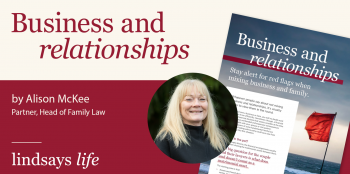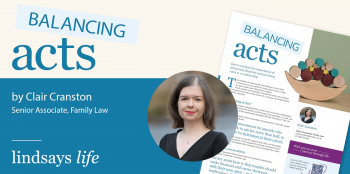The case (AH v CH) was decided by Court of Session family judge Lord Brailsford. It concerned a nine year old boy and had been going on for an incredible seven years. The boy’s Dad had not seen him for about three years when Lord Brailsford made his decision. His Mum had insisted that contact wasn’t in the boy’s best interests and the boy was resolutely against any suggestion that he should see his Dad.
The background
As you can imagine, the circumstances of this family were complicated. The Dad is Tunisian and the Mum was scared that he planned to abduct the child and take him to Tunisia, from where it would be very hard for her to bring him back to Scotland. The judge thought her fears were genuine but that in reality there wasn’t any rational basis for them.
The boy’s views were looked into over a long period by a child psychiatrist and he concluded that, whilst the child was adamant that he didn’t want to have a relationship with his Dad, he hadn’t come to that view on his own. He had been influenced by the fact that he knew that his Mum had a very negative opinion of his Dad.
The decision
Despite all of this, Lord Brailsford decided that it was in the best interests of the boy for direct contact with his father to be re-established. He carefully considered a plan and made an order for contact by Skype or similar first of all, for three or four sessions, then for some supervised face to face contact to take place fortnightly for around three months.
He said that if all of that was successful then the Dad could go back to having regular unsupervised contact.
The child’s best interests
The child psychiatrist had said in his evidence that there are “significant disadvantages” for children who don’t have a relationship with both of their parents.
He said that: “evidence shows that children that do not have contact with both parents have, as a group, a greater propensity to experience difficulties academically, psychologically, emotionally and in future relationships in later life.”
The judge clearly placed some weight on that comment as he said it was a significant consideration which he couldn’t ignore. Lord Brailsford said:
“I would be reluctant to impose direct contact upon a child who did not wish it but for the overriding requirement to have regard to his best interests which must, in my opinion, include his psycho-social development. I have to weigh the potential for adverse effects in later life against a child’s currently expressed opinion against contact.”
He also commented that what was causing the child stress was that ”he felt the need to please his mother and did this by expressing views which were hostile to his father and to contact with his father. This is a very serious matter which has the potential both to cause harm to the child and to affect the chance of future contact operating successfully. It is, regretfully, in my experience, a not uncommon feature of contact disputes, particularly those of an intractable nature.”
The advice for separated parents
“In my opinion the best, and possibly the only, way to address this lies in the hands of the parents. They have in my opinion an overriding duty to put aside any antipathy, distrust or resentment held towards a former spouse in order to ensure that their child is not exposed to the sort of risks identified by Professor MacKay [the child psychiatrist] in his evidence.”
This is pretty strongly worded advice from a judge and separated parents would do well to take it on board when considering what’s best for their children.
If you’d like any more information or advice about the issues raised by this case, or about making contact arrangements for your children generally, please get in touch with our Family Law Team.
Our experienced solicitors provide experience and creativity, and can offer a guiding hand to help you best protect the welfare of your children.








